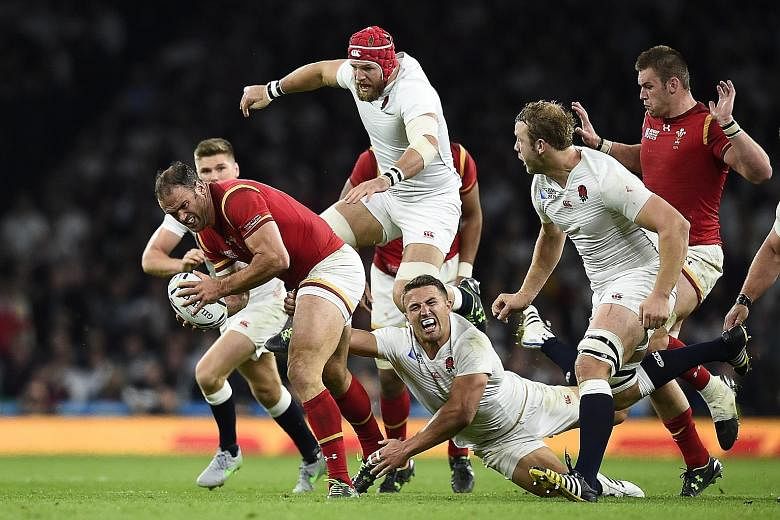The Farrell selection:
In theory
"Kick every possible point on offer, Owen," was the one piece of advice Stuart Lancaster did not need to tell his fly-half. If there has been one point of agreement between the warring Owen Farrell and George Ford factions, it was the superiority of the Saracen as a goal-kicker.
Why else was Farrell selected to start? Under Ford, England of late started too many games shifting sideways. He has been playing on the gain line; Farrell was tasked to get over the gain line; it is a big difference. Maybe merely half a metre but potentially the difference between Sam Burgess battering away on the front foot or floundering behind his pack with the Welsh back row advancing.
Direct in attack and indomitable in defence, no red shirts were to pass and while he was at it, he and Brad Barritt had to keep the midfield structure as Burgess went looking for Welshmen to atomise without leaving an unplugged hole, should player or ball escape his demolishing shoulders.
Bringing the threat of England's wingers into the game was diversionary at best, a welcome bonus, especially in the earlier part of the match when the physical contest was expected most to rage.
In terms of judging Farrell's performance, more significant was the pressure he would exert, or not, on the Welsh back three.
Liam Williams is a fine player but nobody makes the wide acres of a rugby field look as small as a postage stamp, nobody except the missing Leigh Halfpenny. Hallam Amos, a 21-year-old emergency winger, had to be a target for England's attacking cross-kick, utilising the catching and finishing skills of Anthony Watson and Jonny May. As it happened, both went off injured in Wales' astonishing win.
As for the "Ford theory", naming your most creative man as a substitute - this masterplan revolved around the supposed weakness of the Welsh bench.
England, driven by Farrell's directness, might not be out of sight at 60 or so minutes but the plan envisaged Wales on their knees and, bar the brilliant Justin Tipuric, devoid of reinforcement.
As Wales wilted, Farrell would move to inside-centre and Ford was to turn the passionate plan into a cold-blooded execution.
In practice
England led 16-9 at half-time; Farrell had kicked every point possible, including a 45m drop goal. The first penalty was 5m outside Ford's comfort zone but Farrell stroked it with ease through the posts. Two more straightforward efforts sent him down the tunnel with four from four.
The rest of his first half was, quite frankly, fabulous, in an understated sort of way. The lateral lines were left behind after three early passes. Straightening up, he carried hard. Quick, recycled possession led to England's attack ending 5m from the Welsh try line.
Another aggressive ball-carry kept Wales' defence tighter than they would like, narrow enough for England to strike. And so they did in the 27th minute when the fly-half produced a varied dart with the ball in hand, timing a tremendous pass into space.
One phase later, a mis-shapen Welsh defence was penetrated by May. Farrell was oozing control.
Lancaster must have felt delighted as his side emerged for the second half . As the match approached the hour mark, Wales were back within four points and 5m of the English try line.
That was the cue for replacements. But still no Ford.
The Ford finishing school was designated for another day. Farrell was the pragmatic alternative. He played well but the team lacked precision. One 10 does not make a team, nor do a pair of them.

